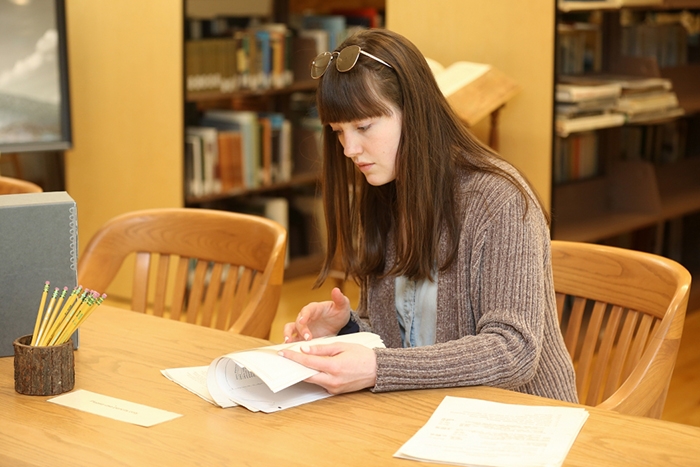Growing up in the shadow of the Adirondacks, Emma Sprotbery ’19 developed a special affinity for its sprawling landscape. An outdoor enthusiast, she has hiked and camped in the mountains.
On the academic side, Sprotbery developed a strong interest in gender studies and equality.
So it was only natural that the environmental policy and English double major (with a minor in political science) combined her two passions for her senior thesis. Using the extensive resources at the Kelly Adirondack Center, Sprotbery undertook a deep dive this winter into Adirondack-based conservation organizations. Specifically, she wanted to examine the role of women in leadership positions in these groups.
For three months, Sprotbery pored over membership rosters and archival databases of the organizations, with a particular focus on the Association for the Protection of the Adirondacks. She also connected with people in the field for their input.
What she discovered was disheartening. Although women have been well-represented in membership rosters and volunteer bases, they are not proportionally represented in the leadership structures of these groups.
“Gender equality seems to only occur when it is the explicit goal of an organization. It does not seem to arise organically,” Sprotbery said. “I was unpleasantly surprised at how long women were underrepresented in nearly every organization I examined.”
Sprotbery’s research revealed that while significant strides towards gender equality were made during the 1980s, very few, if any, organizations achieved parity in the gender composition of executive boards and boards of trustees. That pattern continues today.
She also compared the progress of organizations within the Adirondack region to national and international organizations and found that Adirondack groups have lagged behind those groups, as well.
Sprotbery said her topic has received scant attention from scholars. She believes that has only exacerbated the issue.
“In the absence of research examining the relationship between gender composition of membership rates and leadership, the status quo marches on unimpeded,” she said.
Sprotbery was impressed by the wealth of material she could access at the KAC’s Adirondack Research Library. The library boasts a unique collection of material on the Adirondack Park and the New York State Forest Preserve, including rare books, maps, photographs, documents and the personal papers of some of the region's foremost conservationists.
“Emma's research is another illustration of how there are Adirondack-related topics to be explored in all areas of study,” said Margie Amodeo, coordinator of the KAC. “Much of the existing research on the barriers and bias that lead to the gender gap in organizations has focused on women in leadership roles in large corporations. Emma’s work examined how those stereotypes and patterns apply to non-governmental advocacy organizations within the context of the environmental movement. By speaking with women in conservation groups, she went beyond identifying the obstacles to achieving leadership positions in these advocacy groups and developed a deeper understanding of the issues confronted by women and the tools they’ve needed to be successful.”
Among her many accomplishments and activities, Sprotbery was named to the Liberty League All-Academic team as a member of the volleyball team for the last three years. She also performs with the Garnet Minstrelles, Union’s all-female a cappella group.
After Union, Sprotbery is headed to Cornell Law School, whose admissions committee was impressed by her thesis research.
“Without the help of the Kelly Adirondack Center, my research and discoveries would have been impossible,” she said.
NAME: Emma Sprotbery ‘19
HOMETOWN: Burnt Hills, N.Y.
MAJOR: Double major in environmental policy and English, with a minor in political science.
